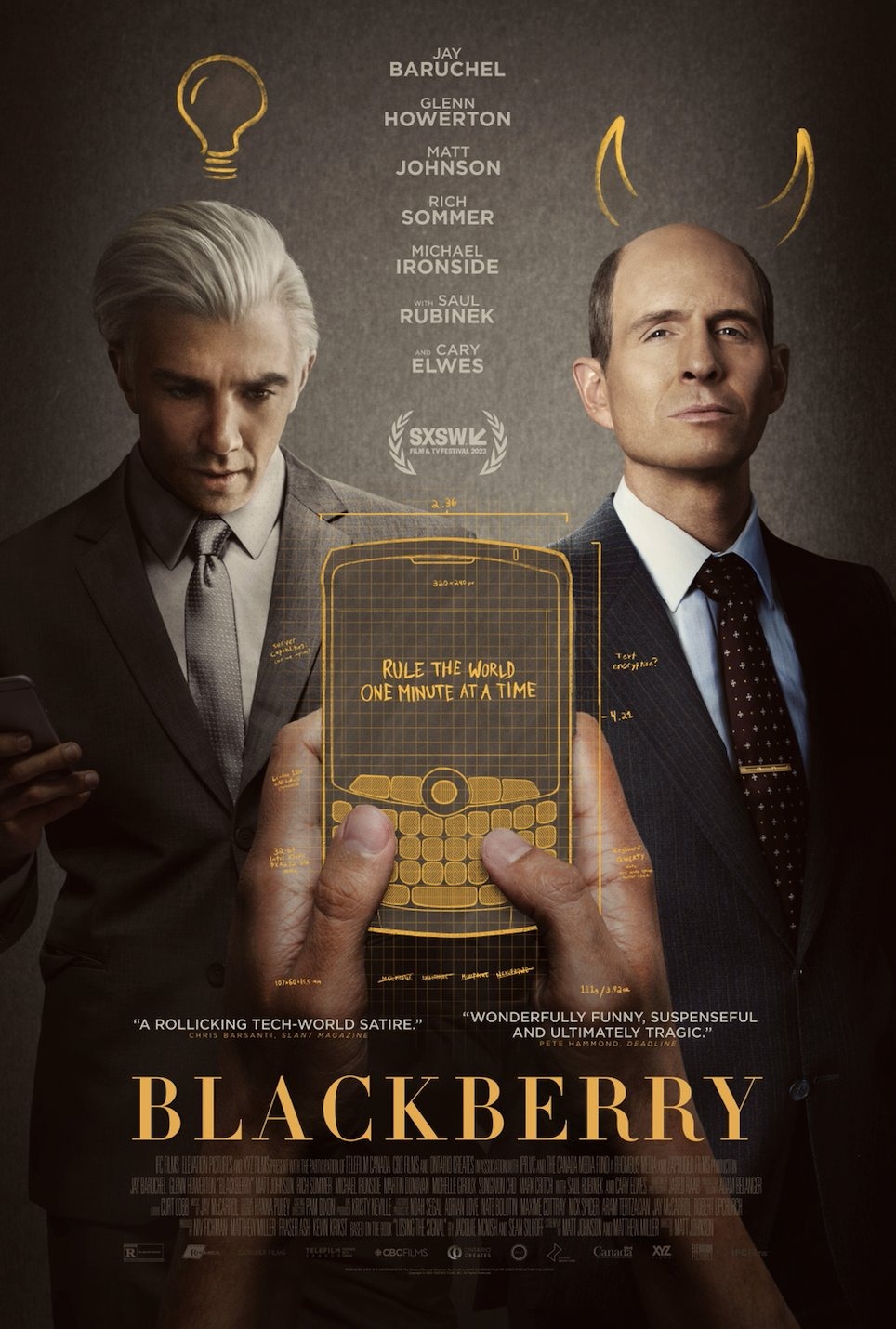Director
Matt Johnson
Starring
Jay Baruchel
Glenn Howerton
Matt Johnson
During the tech boom of the mid-90s, two Canadian friends, Mike Lazaridis [Baruchel] and Doug Fregin [Johnson], approach multiple investors about their radical solution to revolutionising the mobile phone industry. Specifically, incorporating email and the internet into their device. Their sales pitching and business management, however, leaves much to be desired. During one particular pitch, power-hungry executive Jim Balsillie [Howerton] is fired from his job but stakes what remains of his livelihood by investing in this game-changing phone. But this act isn’t one of altruism, as Jim proceeds to take over the company and demean everyone around him. Despite this, the phone’s abilities shine through, and the Blackberry phone a must-have piece of tech.
There have always been niche biopics that are released into the cinematic landscape to limited fanfare, but serve as both time capsule pieces as well as showcases for incredible acting talent. Movies like Glengarry Glen Ross, Steve Jobs, Air and Tetris. And part of the reason they struggle to connect is the initial premise. It’s only when one of these movies excels that it goes from “the Facebook film” to “one of Fincher’s best movies”. Such is the way for Blackberry; a rise and fall story of tech heads vs grifters, of ego, aggression, ambition and hubris.
Taking a leaf out of Sorkin’s book (in the sense that Steve Jobs focused on three different product launches), Blackberry is divided into three parts: 1996, 2003, 2007. Each covers monumental transitional periods for the company; that being it’s inception, zenith and collapse. What’s interesting is that despite the momentum and power achieved, we never get a sense that the ‘good times’ have set in. In fact, one of the film’s greatest achievements is to illustrate that each major juncture of the company’s lifespan is rife with stress, pressure and calamity. This also serves as a fantastic backdrop for the central character study.
See, the movie starts out by illustrating the closeness between Mike and Doug, but underlies the dissatisfaction and lack of trust between them; Mike failing to disclose how much they’ve sunk into a failed modem project, and Doug unable to be the mature partner that Mike needs. As such, we learn very early on that these individuals aren’t necessarily good or bad guys – in simple terms. Nor are they on a path that would turn them into enemies, a la The Social Network. This is more an analysis of how corporate success shone a light on their priorities and put strain on the friendship. Mike was fully committed to making the perfect device, albeit through such a narrow lens that he couldn’t see the possibility beyond what he had accomplished. And Doug wanted to create a fun space for creation and innovation.
Now, as much as it’s not a story of good and bad guys, there is absolutely a villain, in the form of Jim Balsillie. Thanks to the script and Howerton’s performance, Jim is never given a moment to be anything more than a ball of psychopathic drive. He sets his sights on the fledgling company and drags it up by its lapels, with little concern for who or what he damages in the process. For him, the bottom line is all that matters. And yet this works masterfully because it serves as a cautionary tale. Jim is indeed able to elevate the company to the stature that Mike believes it deserves to be. But the price is that Mike learns how to conduct business from someone whose work ethic and moral scruples leave much to be desired.
Subsequently, it’s the relationship and juxtaposition between Jim and Mike that feels more compelling than the one between Doug and Mike. Jim mercilessly bullies Mike but the tech wizard is able to briefly hold his ground, insisting that if they are to work together, they should never lie to one another. Of course, Jim lies immediately by agreeing to that. But as the narrative progresses, we see how incompatible these two are. Culminating in a sea of panic, lies and subterfuge following the announcement of the iPhone. And one of the ways this is really showcased, is through Jay McCarrol’s score. It’s often tense and ominous, and the only cessation we’re offered is a playful digital ballet when Mike is on a roll either in a meeting room or hunched over multiple deconstructed electronic devices. But, that light almost fun energy in the score is completely subdued to the point of being non existent once Mike full transitions into the co-CEO that Jim has sculpted him to be.
Despite being a compellingly made drama, there are a few elements that knock it down somewhat. Most notably, the audience is never given significant insight into the people at the centre of this story. Instead, we’re kept at arm’s length. To explain, the central trio are the most important part of the movie. The assumption that this is a movie about the technical innovations and wonders of the Blackberry itself would be a misunderstanding. But if it’s truly about the dynamic, the impact and the lives these individuals carve out, you’d expect more insight into their inner workings. Regrettably, the film doesn’t slow down to explore these moments, leaving the lead characters as fairly unexplored entities. Sure, we can see the actions and consequences but not the motivations. There’s a handful of nods to them but without taking the time to process the ‘why’ of it all, we’re just left with cause and effect.
Overall, Blackberry is one of those independent features that will no doubt become a cult hit among film fans. A piece passed around as an example of acting prowess and what can be accomplished on a (comparatively) minute budget – in this case $5 million. More than that, it’s also a snapshot of a very specific period of time and style of business operation that is still having ramifications today, and as such is absolutely worth your time.
Release Date:
06 October 2023
The Scene To Look Out For:
Fairly early on in the movie, Jim forces Mike to create a working prototype of his concept overnight. It’s crude and rudimentary but it’s enough to demonstrate the possibilities. This rough-and-ready device is then taken to the Bell Atlantic office in New York where both characters are laid bare. On the one hand we see Jim’s ability to improvise (where ‘improvise’ read ‘bullshit’) and command a room. And on the other, we see Mike’s passion and understanding for the tech, illustrating that he is in fact a thoroughly capable and insightful individual. He merely lacks the presentation skills to sell it.
Notable Characters:
Both Baruchel and Howerton are magnificent in this film. More than that, they are playing to their strengths perfectly: Baruchel gets to channel his subdued dorky presentation, as well as ramping up to plenty of frenetic outbursts. Whereas Howerton gets to unleash the entire spectrum of unhinged that he has cultivated over the years on It’s Always Sunny In Philadelphia. And seeing them square up is wonderful.
Highlighted Quote:
“You have a collect call from “What the fuck is going on!?” will you accept the charges?”
In A Few Words:
“An outwardly unassuming biopic that doubles as an incredibly compelling and well-performed cautionary tale of hubris.”
Total Score: 4/5

![The Red Right Hand Movie Reviews [Matthew Stogdon]](https://reviews.theredrighthand.co.uk/wp-content/uploads/2021/12/cropped-header1.png)



